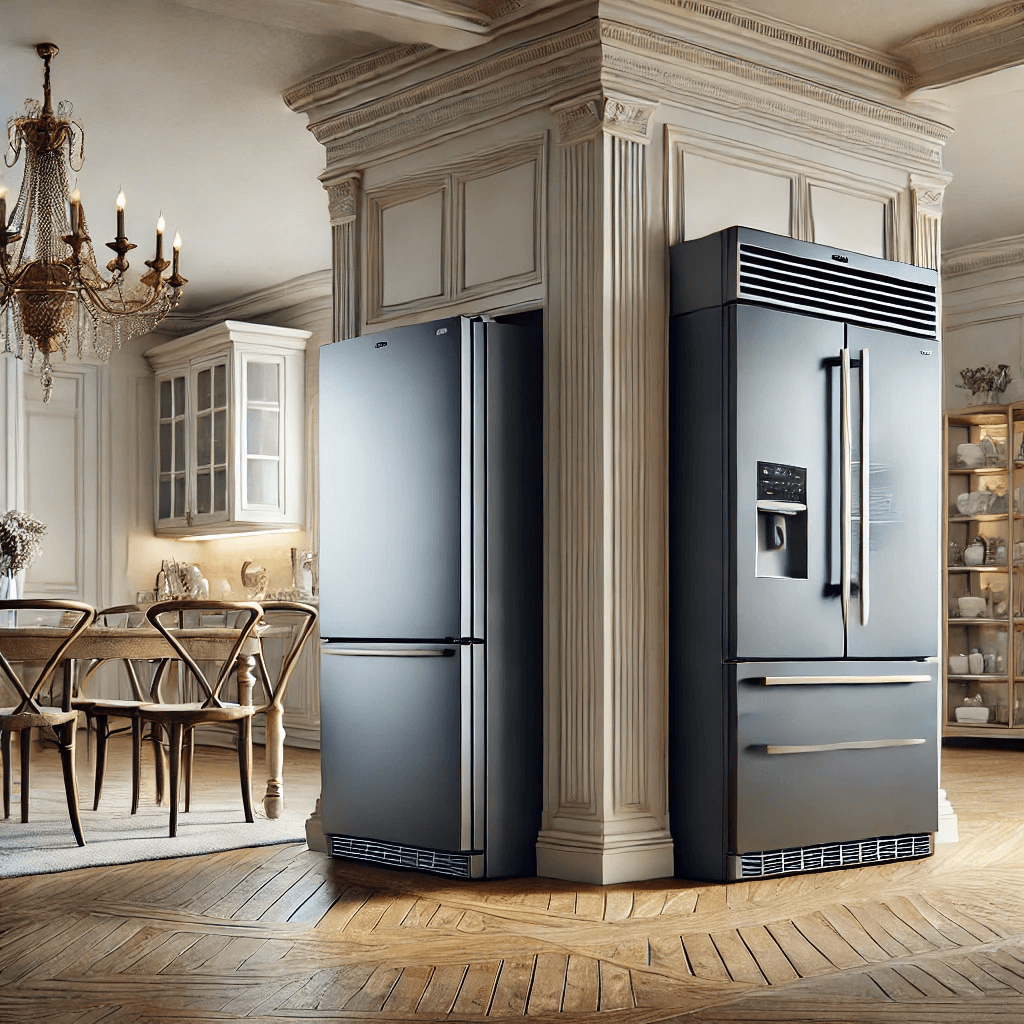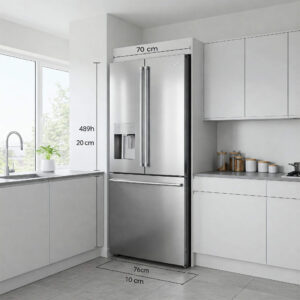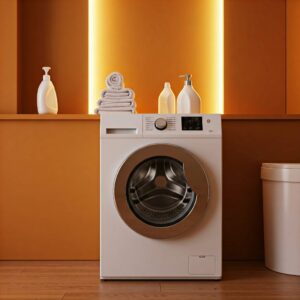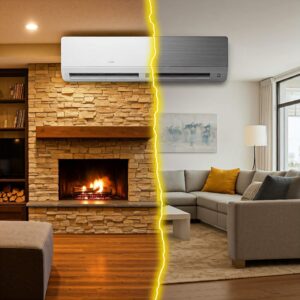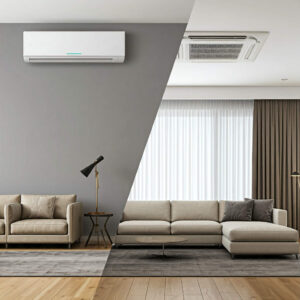When it comes to choosing a refrigerator, the debate between inverter and non-inverter models is quite prevalent. With advancements in technology, the options available to consumers have expanded, offering various features and benefits. The decision, however, boils down to understanding how each type of compressor works, evaluating their benefits, and considering which one aligns best with your lifestyle and needs. Let’s dive deep into the world of refrigerators and help you make an informed decision.
- How Inverter Compressor Works?
- How Non-Inverter Compressor Works?
- Benefits of Inverter Refrigerators
- Benefits of Non-Inverter Refrigerators
- Other Considerations
- Making the Decision
- Conclusion
How Inverter Compressor Works?
Inverter technology has revolutionized the way refrigerators operate. Unlike conventional compressors that turn on and off at full capacity, an inverter compressor adjusts its speed according to the cooling demand. When the refrigerator’s internal temperature rises above the set level, the inverter compressor speeds up to provide more cooling. Conversely, when the temperature is stable, it slows down, maintaining the cooling with minimal energy consumption.
This constant adjustment is possible because of the Variable Frequency Drive (VFD) technology, which allows the compressor to operate at different speeds. By running at variable speeds, inverter compressors reduce energy wastage and ensure a consistent cooling performance. The result is a more efficient and quieter operation, as the compressor doesn’t have to repeatedly start and stop.
How Non-Inverter Compressor Works?
Non-inverter compressors, also known as conventional compressors, operate on a fixed cycle. They work on a simple on-off mechanism: when the refrigerator needs cooling, the compressor turns on at full speed. Once the desired temperature is reached, it shuts off completely. This process repeats every time the internal temperature fluctuates.
While this method effectively maintains the required cooling, it can lead to higher energy consumption. Each time the compressor starts, it draws a significant amount of power, leading to a spike in energy usage. Additionally, the constant on-off cycling can produce more noise and cause more wear and tear on the compressor over time.
Benefits of Inverter Refrigerators
1. Energy Efficiency
One of the most significant advantages of inverter refrigerators is their energy efficiency. By adjusting the compressor speed based on cooling demand, they consume less electricity compared to non-inverter models. This can lead to substantial savings on your electricity bill over time.
2. Quieter Operation
Inverter compressors operate more quietly because they do not have to start and stop frequently. The gradual adjustment in speed reduces the noise levels, making inverter refrigerators a great choice for open-plan homes and apartments where the kitchen is close to living spaces.
3. Longer Lifespan
The constant on-off cycling in non-inverter compressors can lead to more wear and tear, potentially reducing their lifespan. Inverter compressors, on the other hand, run continuously at variable speeds, which can prolong their life and reduce the likelihood of breakdowns.
4. Better Temperature Control
Inverter technology allows for more precise temperature control. By adjusting the cooling output in real-time, inverter refrigerators can maintain a more consistent internal temperature, ensuring your food stays fresher for longer.
Benefits of Non-Inverter Refrigerators
1. Lower Initial Cost
Non-inverter refrigerators are generally more affordable upfront. If you are on a tight budget, a non-inverter model might be a more viable option. The initial cost savings can be significant, especially for those looking to buy a basic refrigerator without advanced features.
2. Simplicity and Reliability
The straightforward design of non-inverter compressors makes them reliable and easy to maintain. Unlike inverter compressors, which rely on complex PCB boards to control and cool the refrigerator, non-inverter models use simpler parts like refrigerants, thermostats, timers, and heating elements. These components are easier to source and cheaper to replace. The PCB boards in inverter refrigerators can easily cost up to 5 to 20% of the refrigerator’s price, adding to the overall maintenance expense.
3. Adequate Performance
While non-inverter refrigerators may not offer the same level of efficiency and precise temperature control as their inverter counterparts, they still perform adequately for most households. They can effectively keep your food cold and frozen, meeting the essential needs of refrigeration.
Other Considerations
Environmental Impact
Energy efficiency is not just about saving on your electricity bill; it’s also about reducing your carbon footprint. Inverter refrigerators, with their lower energy consumption, are more environmentally friendly. By choosing an energy-efficient appliance, you contribute to the reduction of greenhouse gas emissions and help combat climate change.
Smart Features
Many modern refrigerators, especially inverter models, come with smart features that enhance convenience and functionality. These can include digital temperature controls, smart diagnostics, and even Wi-Fi connectivity for remote monitoring and control. While these features can be found in non-inverter models as well, they are more commonly associated with inverter refrigerators.
Maintenance and Repairs
Inverter refrigerators, with their advanced technology, may require specialized maintenance and repairs. It’s important to consider the availability of service centers and qualified technicians in your area. On the other hand, non-inverter refrigerators, with their simpler design, might be easier and cheaper to repair if something goes wrong.
Usage Patterns
Your usage patterns and household size can also influence your decision. If you have a large family or frequently host gatherings, an inverter refrigerator’s ability to handle varying cooling demands efficiently can be a significant advantage. For smaller households or those with less demanding cooling needs, a non-inverter refrigerator might suffice.
Energy Ratings
When shopping for a refrigerator, pay attention to the energy rating labels. These labels provide valuable information about the appliance’s energy consumption and efficiency. Inverter refrigerators often have higher energy ratings (4 to 5 stars), indicating better performance in terms of energy savings.
Making the Decision
Choosing between an inverter or non-inverter refrigerator ultimately depends on your priorities and circumstances. Here are some key considerations to help you make an informed decision:
Budget
If your primary concern is the initial cost, a non-inverter refrigerator might be the way to go. They are generally cheaper to purchase, making them an attractive option for those on a tight budget. However, it’s essential to consider the long-term savings on energy bills that an inverter refrigerator can provide.
Energy Efficiency
For those who prioritize energy efficiency and want to reduce their environmental impact, an inverter refrigerator is the better choice. The energy savings over the appliance’s lifespan can outweigh the higher upfront cost, resulting in lower overall expenses.
Noise Levels
If you value a quiet home environment, an inverter refrigerator is the way to go. The reduced noise levels from the continuous operation can make a significant difference, especially in homes with open floor plans or shared living spaces.
Longevity and Reliability
Inverter refrigerators tend to have a longer lifespan due to the reduced wear and tear on the compressor. If you plan to keep your refrigerator for many years, investing in an inverter model can provide better value in the long run.
Advanced Features
If you are interested in smart features and advanced technology, inverter refrigerators often come with more options. Some noteworthy features are like special refrigerator compartments that provide precise temperature control for specific types of food. Such feature is made possible by inverter controlled fans that adjust their speed based on the cooling demand.
Conclusion
The choice between an inverter or non-inverter refrigerator depends on various factors, including your budget, energy efficiency preferences, noise tolerance, and desire for advanced features. Understanding how each type of compressor works and their respective benefits can help you make an informed decision.
Inverter refrigerators offer superior energy efficiency, quieter operation, longer lifespan, and better temperature control. They are ideal for those who prioritize long-term savings and environmental sustainability. On the other hand, non-inverter refrigerators are more affordable upfront, simpler in design, and reliable for basic cooling needs.
Ultimately, both types of refrigerators have their own set of advantages and can serve different needs effectively. By considering your specific requirements and weighing the pros and cons, you can choose the refrigerator that best suits your lifestyle and preferences.
For more buying guides, read our blogs here.
You May Also Like
- How to Choose the Right Refrigerator Size for Your Home?
- Why Is My Washing Machine Not Draining Water?
- Why You Should Deep Clean Your Washer Dryer Once a Year?
- Inverter or Non-Inverter Air Conditioner: Which To Buy?
- What is the Right Air Conditioner Horsepower for Your Home?
- 5 Tips to Buy an Air Conditioner in Malaysia

